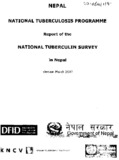Please use this identifier to cite or link to this item:
https://hdl.handle.net/20.500.14356/769Full metadata record
| DC Field | Value | Language |
|---|---|---|
| dc.contributor.author | Development For International Development (DFID) | |
| dc.date.accessioned | 2013-01-01T18:47:05Z | |
| dc.date.accessioned | 2022-11-08T10:20:14Z | - |
| dc.date.available | 2013-01-01T18:47:05Z | |
| dc.date.available | 2022-11-08T10:20:14Z | - |
| dc.date.issued | 2007 | |
| dc.identifier.uri | http://103.69.126.140:8080/handle/20.500.14356/769 | - |
| dc.description.abstract | Summary: The annual risk of tuberculosis infection (ARTI) is a sensitive indicator of the epidemiological salutation of tuberculosis (TB) in a country. It expresses he overall impact of incidence of infectious cases and duration of diseases in the community, efficiency of the TB control program as well as the environmental and social factors influencing transmission of infection. The ARTI is calculated from the prevalence of infection estimated estimated through cross-sectional tuberculin surveys in a representative sample of children. | en_US |
| dc.language.iso | en_US | en_US |
| dc.publisher | Development For International Development (DFID) | en_US |
| dc.subject | Tuberculosis | en_US |
| dc.title | Nepal National tuberculosis programme report of the National tuberculosis survey | en_US |
| dc.type | Technical Report | en_US |
| Appears in Collections: | Post Graduate Grant (PG) Reports | |
Items in DSpace are protected by copyright, with all rights reserved, unless otherwise indicated.

